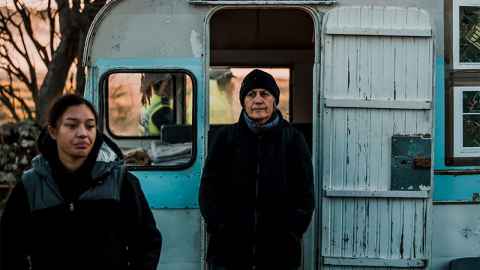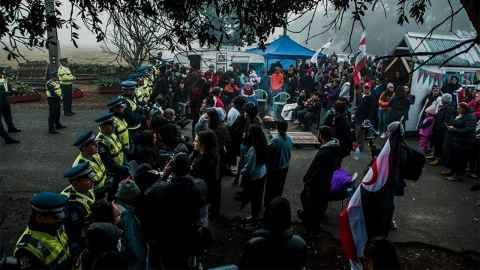Rising up in the spirit of justice
25 July 2019
Opinion: Ihumaatao is about to be bulldozed. Will the Government continue to turn away? Dr Frances Hancock and Qiane Matata-Sipu write from the protest site.

July 24, 2019. A Kaitiaki of the whenua at Ihumaatao calls at 10.41pm. Her voice is joyous; “we’re safe, we’re fine”, she says. Right now, 25 police officers on the front line are facing whaanau of Ihumaatao and supporting land protectors. The tamariki pushed the police line back on the whenua a few hundred metres today and people have begun to take back the land and pitch tents. We have eight portaloos. Three fires. The Kai Koha shed is packed to the ceiling. Kaitiaki are sleeping. Music is going. People are singing. Photographers are still taking photographs. Whaanau are looking after manuhiri, others are taking charge. A chiller just arrived! Tomorrow we’ll establish a waste station.”
All of this is what truly matters. The mauri and the wairua are strong. The mist sits on the whenua until late in the morning, the air is crisper than it’s ever been and the presence of the tuupuna is palpable. The karakia chanted every morning and evening reminds everyone to be the best they can be because what’s at stake here truly matters.
Ihumaatao is again witnessing crisis. It is hard and difficult because it is hard and difficult.
Ancestral whenua with waahi tapu status and huge significance to our nation is about to be bulldozed by transnational corporation Fletcher Building Limited. Against huge odds, the response of people now gathering at Ihumaatao is deeply authentic and honourable.
Fletcher say they’ve done everything by the book, have the consents and are itching to begin works. “Come back in four years and see the community we have built here,” says CEO Steve Evans as the Police moved in.
But a community already exists here.
Te Kawerau a Maki are being consulted as ‘the’ iwi of this whenua and has partnered with Fletcher to progress its 480-unit housing development.
Prime Minister Jacinda Ardern said on July 24 the matter is a private dispute and she didn’t want to come in over the top of "the local iwi".
Senior Maaori ministers said the ‘protesters’ should stand down.
Refusing to acknowledge the history of land alienation and unjust treatment of mana whenua groups (plural) suggests the Crown is focused on keeping a large corporation on side.

Yesterday Dame Tariana Turia described the Prime Minister’s refusal to intervene as a "cop out". Turia was reported on Newshub saying: "People want to get into politics, want to get into power but when it gets hard, they don't want to do anything about it because they know that it's the kind of issue that will affect them politically."
The Prime Minister got it wrong.
Differences must be recognised. The people most affected by this development − whaanau of Ihumaatao papakaainga and Makaurau Marae – were excluded from decision-making that has brought about this situation. They strongly oppose the Fletcher development.
The sticking point is this: Will the Government turn towards Ihumaatao or continue to turn away?
Every indication suggests the Government thinks it can ignore this crisis.
The land protectors say, “We’re here to stay.”
If the Government turns towards Ihumaatao, it opens the door to create an outcome that will benefit the nation and the people most affected by the ongoing injustice to this whenua, whaanau and papaakainga.
If the Government digs in its heels and refuses to engage, they may face a rapidly-growing and unwieldy political debacle.
This week’s eviction evoked other dreadful evictions that remain a festering sore.
Refusing to acknowledge the history of land alienation and unjust treatment of mana whenua groups (plural) suggests the Crown is focused on keeping a large corporation on side. But this story has been developing for more than 150 years and for some iwi, hapuu and whaanau the contested land represents the very last whenua left of an inheritance that should rightfully have been theirs.
This week’s eviction evoked other dreadful evictions that remain a festering sore. On Tuesday the latest land grab was another traumatising experience.
The whaanau of Ihumaatao have maintained a peaceful presence over generations despite the land theft, the pollution of the moana and awa from the Maangere wastewater treatment plant, the destruction of the maunga for roading scoria, industry encroachment and a careless dye spill that threatened the life of the awa. The whaanau of Ihumaatao and Makaurau Marae say: Enough is enough.
Something is happening at Ihumaatao − it’s beyond legal argument or stock-standard policy decision-making.
Hundreds are gathering. Schools and kura kaupapa groups visit to perform waiata and haka, bolstering the spirits of the land protectors sitting around open fires. Maaori orators tell eloquent and deeply moving stories.
Councillor for Manukau Efeso Collins came to show his support and think through possibilities. “I’m trying to suggest more ways forward,” he said.
The Green Party issued a statement supporting the land protectors and calling on the Government “to immediately step in, stand down the police, and negotiate with mana whenua for a return for the land, which was confiscated in 1863”.
Indigenous peoples seeking to protect Mauna Kea in Hawai’i have expressed solidarity as indigenous peoples around the world speak out against corporations exploiting their taaonga.
Diverse groups joined forces to organise a hikoi through the streets of Wellington drawing 500 New Zealanders.
As things stand, Fletcher investors in other countries could be left to decide the future of land they know nothing about, and care less why it matters so much and to whom.
Mana whenua and their supporters say they will stay at the whenua until there is a resolution.
Ihumaatao deserves this special consideration.
*This opinion piece uses double vowel orthography rather than macrons.
Dr Frances Hancock is a professional teaching fellow at Te Puna Wānanga in the Faculty of Education and Social Work. She has been with the SOUL Campaign from the beginning. Qiane Matata-Sipu is a direct descendent and resident of Ihumaatao, a co-founder of the SOUL Campaign and a journalist.
This article reflects the opinion of the authors and not necessarily the views of the University of Auckland.
Used with permission from Newsroom Rising up in the spirit of justice on 25 July 2019.
Media queries
Alison Sims | Research Communications Editor
DDI 09 923 4953
Mob 021 249 0089
Email alison.sims@auckland.ac.nz